At Thursday’s Board of Education meeting, Greenwich Public Schools parents, students and union leaders advocated for programs they didn’t want to see cut for the sake of saving $4.1 million from the district’s operating budget.
That dollar amount stems from a vote made by the Board of Estimate and Taxation on April 3, when Republican chair Harry Fisher used his tie-breaking vote to tip the 6-6 party-line vote to 7-6 in favor of approving the $4.1 million cut to the schools operating budget for 2026.
The audience immediately boo’d and people stood up and shouted, “Shame on you,” and “Remember in November.”
A week later, the BOE budget committee met to start a discussion on where to find savings.
The board focused discussions on three areas: Transportation and school start-time scenarios, the Advanced Learning Program and a $220 fee to for GHS athletes to participate in a sport.
“Anything we are putting on the table in the discussion tonight is coming from our collective community with suggestions from GEA (teacher union), GOSA (union of administrators), PTA, the community at large and the BOE,” schools superintendent Dr. Toni Jones said.
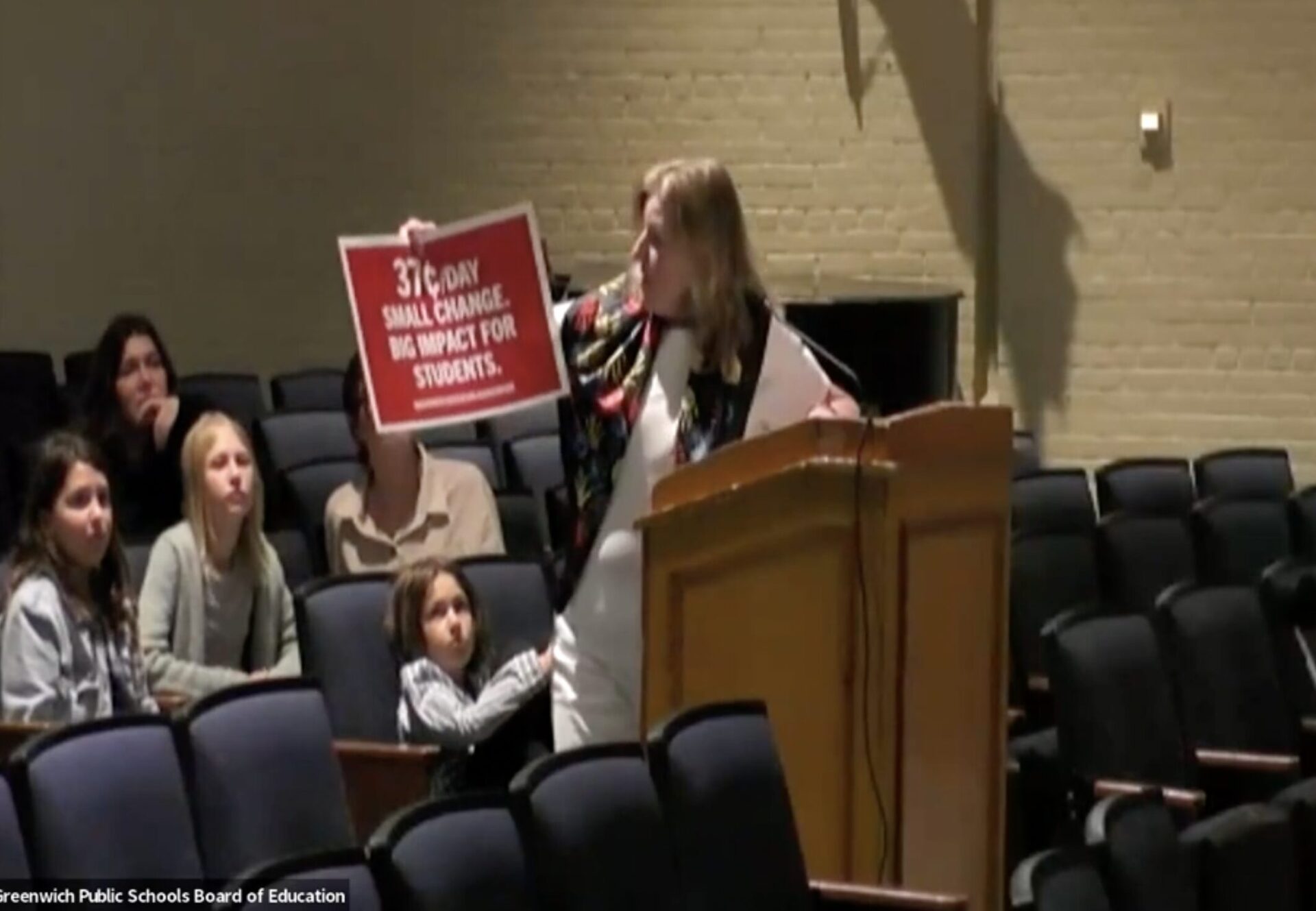
GEA president Lil Perrone held up a sign as she testified at the BOE meeting saying, “37¢ a Day – Small Change. Big Impact for students,” referring to the amount per day it would cost for each of the 8,500 children in GPS to make up for the $4+ million schools operating budget reduction.
During public comment the teacher union president, Lil Perrone said that for the five past years she had asked the finance board to fund the schools budget and asked for more respect for teachers.
“I notice a trend,” she said. “Here I am again standing before all of you and asking the BET to reconsider the SOMR of the RTM (to request that the BET re-open the Operating Budget vote) and fund the BOE’s fiscally responsible budget. Go figure.”
“These six (Republican) BET members are spin-masters trying to mislead the public with false narratives, again saying our teachers are paid too much,” Perrone said.
“You want to hire the least expensive teacher. Yep, that’s what we do in real life: Hire the least qualified. The least qualified to build our home. The least qualified to be our surgeon.”
“These continued cuts in order to to keep the mill rate as flat as possible are decimating to our schools and negatively impact our entire community,” Perrone continued. “The hallmark of a Greenwich education has always been striving for excellence. It’s what students deserve and what parents have come to expect.”
Also, several young students testified, asking the BOE not to cut sports or the Advanced Learning Program.
Sabrina, a fourth grader from Cos Cob School said she ALP was very important to students who qualify for the program.
“Before ALP I got yelled at for finishing my math assignment quickly and working on to the next lesson. I didn’t even want to go to school any more. In ALP, I get to do challenging work that lets me explore topics more deeply. It’s actually fun and now I have friends whose brains work like mine. In ALP we get to do extra projects on things we are excited about.”
“If you cut ALP, then I’ll have to do fifth grade math again next year,” she added, noting that she was already a year ahead in math.
Laura Erickson, a former member of both the BOE and the BET said the BET’s “precipitous” vote to cut over $4 from the BOE’s approved 2026 budget was regrettable.
Given the board was considering rolling back the GHS school start time to 7:30am from 8:30am, Erickson shared her perspective as former chair of the BOE during the extensive process the school start time change was debated.
“It was an extensive process and we heard from many members of the public, both pro and con. The board voted 5-3 in June 2016 to adopt a later start time as of the 2017-18 school year and I think it’s fair to say that vote was representative of the larger community concerns.”
She said it would be unfortunate to roll back the start times without a similar process.
“This might be a case of the toothpaste is out of the tube,” she said.
Then, she said putting on her “BET hat,” her advice was to find cost savings with the least impact to staff and students, and then seek an interim appropriation from the BET for the balance.
She said that would give the BOE time to give previously reported and new information, as well as analysis of what the BOE budget would look like without the cost of private school transportation, which she said used to be carried on the Town’s budget, and then the capital items which are transferred from capital to operating, which also includes digital learning.
“These accounting changes weren’t meant to be punitive,” she said. “I urge you to make the best decisions on behalf of our students and staff, for the right reasons, and not because an arbitrary number is before you,” Erickson said.
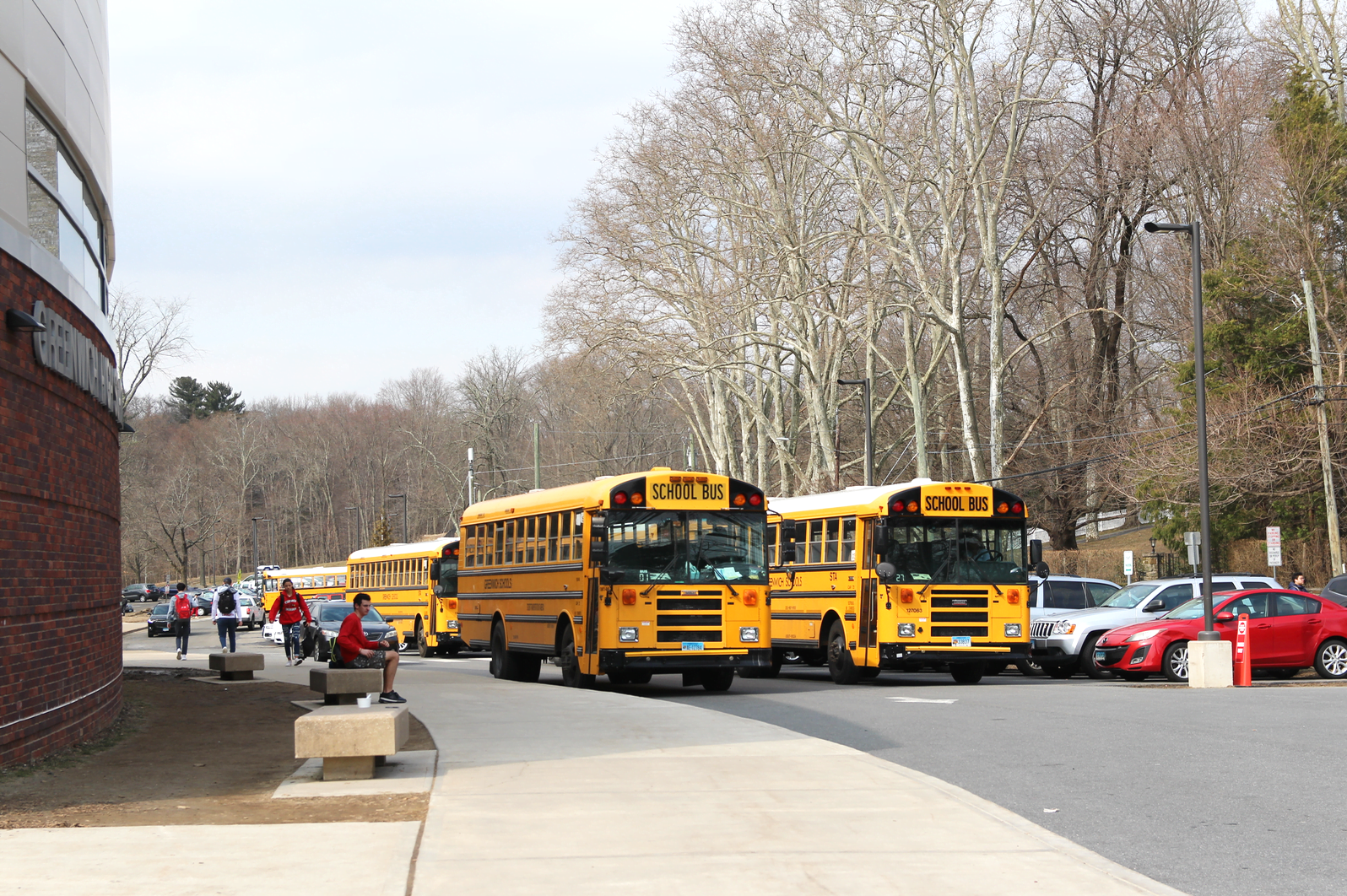
Transportation and School Start Times
Greenwich Schools COO Ben Branyan reviewed five possible transportation scenarios that would yield savings, saying the more schedule disruption, the more savings.
Scenario #5 includes adjusting Greenwich high School start time to restore it back to 7:30am (prior to 2017), plus minor adjustments to middle school and elementary schools.
Scenario #5 would yield the largest bus savings: $2.5 million based on reducing 23 buses.
Jones said scenario #4 would maintain the 8:30am start time at the high school, but shift elementary school bell times. Savings would be $1.3 million.
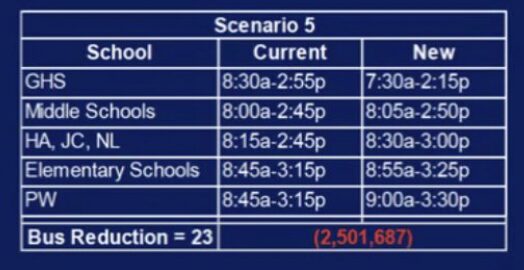
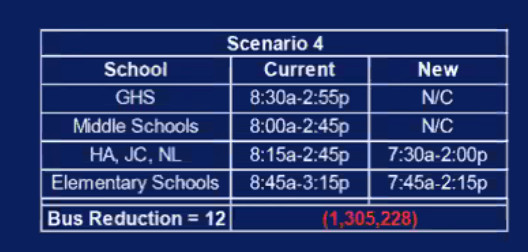

BOE chair Karen Hirsh said that while she was not on the board when at the time of the vote to change school start times, she had participated on committees that studied it.
(Back in 2016, in a vote of 5-3, the Board of Education endorsed a later start at Greenwich High School.)
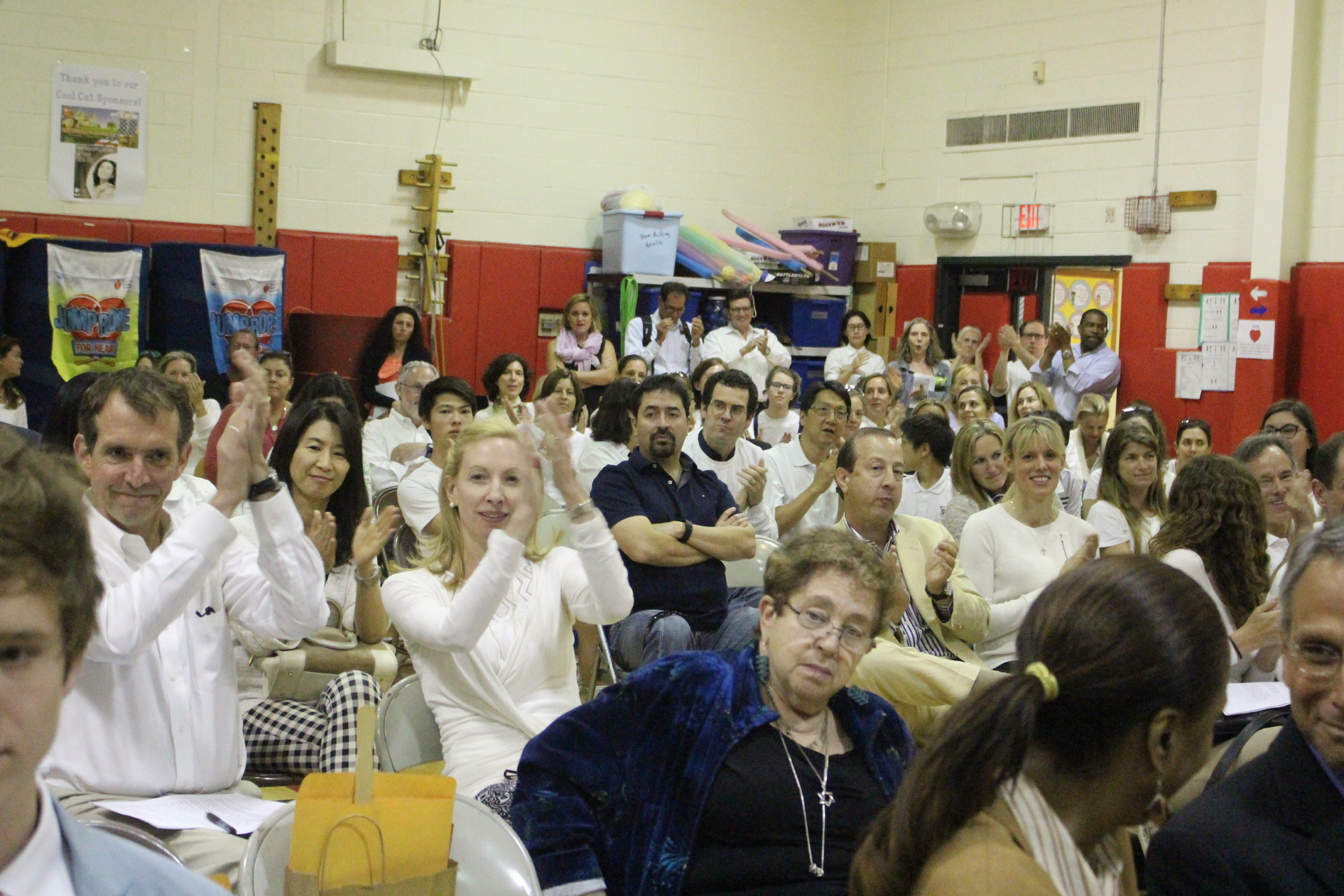
In 2016, GPS parents dressed in white to show their support for a later start time at Greenwich High School. Photo: Leslie Yager
Hirsh said her recollection was that the idea was for Greenwich to be a leader in making the change, but only one or two other districts had followed suit, and that some other districts had made the change, only to reverse it later.
“Financially it is almost impossible for most communities to do,” she said. “Transportation costs are rising. We don’t have enough buses or school bus drivers. You need more when you change school start time.”
Dr. Jones listed high school start times in nearby towns.
Fairfield starts at 7:30am.
Darien starts at 7:40am.
Stamford starts at 7:25am.
Weston starts at 7:45am.
Wilton starts at 8:20am.
New Canaan and Westport both start at 8:00am.
BOE member Sophie Koven said later start times for elementary schools presented a challenge for working parents, and amounted to pushing a new cost onto them since they would have to pay for before-school care.
Ms Koven said her child attended GHS at the 7:30am start time for two years, and at the 8:30am time for two years.
“Most students are not going to go to bed an hour earlier,” she said.
Instead, she said, “They’re losing an hour a night. When you look at that over the course of 4 years, roughly that means you lose 80 hours of sleep. It’s one hour a night over a school year, times four years – that’s 90 nights of lost sleep.
“There is a really significant cumulative effect. It’s hard to measure. What does that mean academically? What does that mean in terms of your physical health? What does that mean for your mental health?” Ms Koven asked. “I really have concerns about this. I understand it was an expensive decision we made, and I think it would be a shame – if we do it, that’s what we’re doing to our kids.”
BOE member Kathleen Stowe said families had adjusted their lives, their work schedules and their parenting to the existing schedule.
“If we go right back to 7:30am, we have to think about the trickle down effect.”
“You mentioned that we would have to work with the Boys & Girls Club if we modified the schedule, and there are likely other consequences we are not even aware of with so little time to plan for this change,” Ms Stowe said. “For example, changing start time to 7:30am will likely eliminate block 0.”
(Block 0 is a block offered before block 1 at GHS to accelerated middle school math and science students.)
“You’re going to have to go out and do that analysis,” Stowe continued. “It’s an attractive number…(but) there are families that are going to be drastically impacted by this.”
Ms Stowe said scenario #4 to keep both GHS and middle school bell times the same, was attractive, but it would be important to poll families from the elementary schools.
Ms Hirsh said the change that went into effect in 2017 reflected a year or two of “struggle and stress” and working with other districts to coordinate.
BOE member Laura Kostin asked about the private school bus schedule.
Ms Stowe said the private schools own their buses, but the public school district pays for their transportation.
Mr. Branyan said all 5 transportation scenarios retained the bell times for private schools.
“The reason this represents savings is because this allows us to use one bus multiple times,” said BOE member Cody Kittle said.
Board member, Dr. Michael-Joseph Mercanti-Anthony said it would be important to poll parents.
“We have to think about how we ask that question because nobody likes change,” Mercanti-Anthony said. “We have to be very honest about how we ask the questions. We can’t just say, are you in favor of a 7:45 start time? (for elementary school)?”
Dr. Jones said there wasn’t enough time to poll families.
“We have to move quickly because we need to know what it is we are doing, especially with teacher contracts coming up,” Jones said. “We need some solid decisions pretty fast.”
“Something is going to change, either the elementary schools or the high school,” Kittle said. “Either way the there will be unintended consequences. We will still not be fully able to anticipate those…that’s fine. I treat them in my head as a wash.”
“I believe in representative government enough to think that we can take the leap on behalf of all the parents who elected us – or some of us,” Kittle said.
“This impacts 8,000+ students,” Ms Hirsh said. “A lot of those families have students at multiple schools….This affects people’s jobs. I think we should at least ask.”
“What is the option of doing none of these horrible things, and going for an interim (appropriation from the finance board) and saying we don’t want any of these things?” Ms Kostin asked. “We don’t want to do this to our community. We’re being forced to do this by a few people on the BET who hold the power.”

Subscribe to the daily Greenwich Free Press newsletter.
“I have to say it out loud, on page 23 of our budget book, we are giving the BET $4,219,750 in our operating revenue that they take from us, and then they’re asking us to come back to them with another $4 million in savings because they take all of our tuition from Pre-K and grant money – the town takes it all – and tell us you have to cut to save $133 per person in town and then we’re asking the other taxpayers in town pay for their sports. It’s mind-blowingly stupid.”
“I hear you,” Dr. Mercanti-Anthony said. “Say we continue with our budget and then we run out of money and then we ask for an interim and that interim is turned down and at that point we’re stuck the middle of the year trying to find $4.5 million.”
“At that point we’re looking at massive layoffs,” he added. “It’s not a responsible way.”
“We’re being asked to do the most ridiculous things, by people I wouldn’t put in charge of my goldfish,” Kostin said.
“I agree,” Dr. Mercanti-Anthony said.
“Laura, I like your revolutionary attitude,” Mr. Kittle said. However, he added, “I want to advocate for helping the team get to a proposed budget that we can consider.”
Ms Hirsh said, “I have dreaded this discussion and the decision we have to make but we have been elected by our peers in this community.”
“It would also be irresponsible for us not to have these discussions,” Hirsh said. “I don’t want to force this back on our superintendent. It’s our responsibility as well.”
“Per state statute, the town finance board is supposed to respond within 10 days in writing to the BOE budget, which most certainly the BET did not do – to come back with non educational efficiencies,” Hirsh said.
BOE members commented that the BET had not factored in teacher contracts and contractual obligations, such as the maximum number of students per class.
Cuts to the Advanced Learning Program
Mr. Branyan presented a calculation the savings from eliminating grade 2 ALP enrichment ($171,600) and grades 3-5 science ALP ($257,400), for a total of $429,000 in savings – an equivalent of 5.5 full time employee reduction.
“Just remember FTE is actual people,” Hirsh said.
“(ALP) is an amazing program that not only helps the ALP students, it helps the students in the general education classroom, with the teachers having more time to give them personalized instruction as well. To me, this is so short-sighted,” Ms Stowe said.
“It’s not something at all I support I’m surprised it was even suggested. People move to Greenwich because we are different because we actually educate the gifted. The only requirement from the state is that we identify students who are gifted, but don’t have to do anything about it. It would be a real shame if we lost that edge.”
“These are relatively small numbers compared to what we have to get to,” Ms Koven said. “This just feels like death by a thousand cuts, or pass the mediocrity. We’re supposed to be striving for excellence.”
“I would not be supportive of this,” Koven said.
BOE member Jen Behette agreed.
“We want our students to be the best learners. It’s in keeping with the mission of the board. Cutting instruction and cutting potential for students – I don’t agree with that at all.”
BOE member Wendy Vizzo Walsh said she was not in favor of cutting the Advanced Learning Program either.
“I think it sets up our schools to be great,” she said.

Student Athletes Pay-to-Play $220 per sport?
Mr. Kittle, who is the BOE budget committee chair, said one idea to save money would be to implement a pay-to-play scheme for athletes.
Kittle said charging a $220 fee per athlete, per sport, based on 2,072 athletes, yielded a savings of $455,600 – or 20% of the GHS Athletics budget.
“It’s still heavily subsidized, but you pay for one fifth of it,” he said.
Dr. Jones said the athletics budget for the high school was over $2 million
“It’s a big number. We have a large athletics program. We’re a large high school,” she said.
Jones said three other districts had implemented pay-to-play for high school sports, including Ridgefield which charges $150 per student, per sport per season; Trumbull’s fee is $165 and a fee of $365 for ice hockey. Wilton charges $125.
Ms Koven said most GHS sports were already “a little bit” pay-to-play, since booster clubs raise funds.
“There is no requirement to give to the booster club, so the families who can give to the booster club do. But to be clear, it’s not like this would be the first dollar that you’re spending to play lacrosse. This would be on top of the amount that many families already pay to the booster club,” Koven added.
She said a family with two kids at GHS who each play three sports added up to a lot of money and would limit the ability of families to participate in sports.
“We need to think about the impact to families,” she added.
“I’m not happy about it, but it is something that we have to consider,” Dr. Mercanti-Anthony said, adding that like with the free and reduced lunch program, there should be a safety net and waiver build in.
Dr. Jones said she previously worked in a district that implemented pay-to-play for sports during a particularly challenging economy.
“It’s hard when you’re a high school student to have to go to your coach or athletic director and say my family can’t afford it. Or your dad just lost your job, and you don’t want all your friends to know your family is really struggling.”
“Some of them won’t ask their parents – they’ll make the decision not to play,” Jones said. “It’s not any different with free and reduced lunch. If you look at high schools, especially any large high school, there are students who quality for free (lunch) they just won’t turn in the paperwork. Some of them just don’t eat because if they always get the same tray, other young people will know that they’re on free or reduced.”
“It’s a lot more than people think in Greenwich,” she said.
“We’re winning state championships left and right, but you have to pay to play here? It just doesn’t feel right,” Ms Stowe said. “For a lot of people they’re budgeting everything.”
“No thank you on this one,” she added.
“I’m loathe to do this because so many of our students are recruited to colleges based on sports,” Hirsh said. “Or they’re getting scholarship funding. It takes away their opportunities beyond Greenwich.”
Ms Walsh said she did not favor pay-to play either.
“However, if we are considering doing this, then we should not limit it to just athletes. We should look at other after school programs, like the theater production.”
Ms Behette agreed it wasn’t fair to single out one after-school program.
“We can’t single out athletes,” she said.
“It does seem arbitrary,” Kittle said. “The costs vary dramatically by sport.”
He suggested considering different fees for the more expensive programs, and not just athletics.
Kittle said all the options involved trade-offs.
Sophie Koven said that while the BET had talked about “keeping Greenwich affordable,” implementing pay-to-play athletics at GHS would have the same result.
“Pay-for-play is putting a burden on our neediest families,” she said. “Making a cut and saying to families who are struggling, now you have to pay $220 a season for your student to play sports makes Greenwich much less affordable for all of those families in a really significant way, and is a lot more costly than actually paying for the increase on a house-per-house basis.”
See also:
Big Support at RTM for SOMR Requesting BET Reopen Vote on 2026 Schools Budget after Passing a $4.1 Million Cut April 22, 2025
Greenwich Schools Challenged to Accommodate $4.1 Million Budget Shortfall: Restore Previous GHS Bell Times? April 11, 2025
BET Cuts $4.1 Million from Greenwich Schools: Audience Chants “Shame on you” April 4, 2025
Greenwich Schools Chief Rebuts RTC Chair: “This Level of Reduction Would Have Long-Lasting Consequences” April 2, 2025